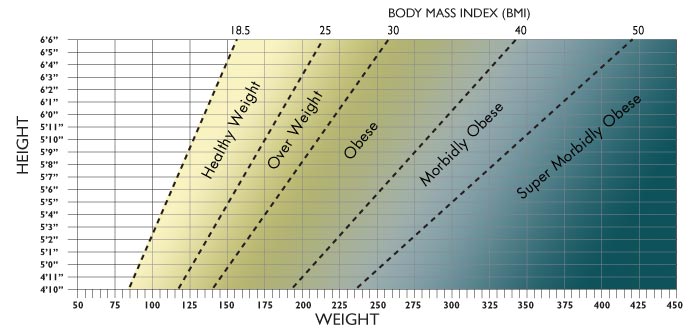
|
Body Composition There are a variety of methods for assessing a person’s level of fitness and/or their level of excess weight. Many of these methods are costly, require specialized tools and equipment, and are inconvenient or impractical for most people to undergo. Some of these are Hydrodensitometry (whereby the subject is immersed in a tank of water and their body weight measured in comparison to that out of water), Anthropometry (whereby the subject’s body composition is measured using skin fold calipers at a variety of predetermined sites across the body), and Bioelectrical Impedance (whereby a complex mathematical formula is applied to a measure of resistance of an electrical impulse sent through the subject’s body). |
Body Mass Index (BMI) Typically coinciding with the BMI measure, a person is considered obese when his or her weight is 20% or more above normal weight, or has a BMI of 30 or greater. Morbid obesity means that a person is either 50%-100% over their theoretical normal weight; more than 100 pounds over normal weight; has a BMI of 40 or higher; or, is sufficiently overweight to severely interfere with health or normal physical function. It is uncommon, but there are individuals whose BMI exceeds 50. These individuals may be referred to as “super obese”. |
|||
|
|||||
Did You Know? Certainy statistical calculations suggest that, given current trends over the past 30 years, the entire US population could be obese by the year 2230 if these trends persist.1 1. Foreyt JP. Goodrick GK. The ultimate triumph of obesity. Lancet. 1995;346:134-135 |
You are Not Alone 30 percent of men and 40 percent of women between the ages of 40 and 49 suffer from obesity (BMI >30). The ideal weight and fat-lean ratio varies considerably for men and women and by age, but the minimum percent of body fat considered safe for good health is 5 percent for males and 12% for females. The average adult body fat is closer to 15 to 18% for men and 22 to 25% for women. Too much body fat is harmful. For men over 25% and women over 32% fat there is a dramatic correlation with illness and disease. Causes of Obesity Calories are expended, or burnt, through he metabolic activity of lean tissue. Calories are burned daily simply through the normal functioning of your organs. Your kidneys, for instance, filter waste products from your blood. They require energy, in the form of calories, in order to do this. Similarly, your heart requires calories in order to pump blood; the muscles your legs require calories to walk; even your hair follicles require energy to grow hair. |
When an individual consumes more calories than he or she typically expends over the long term, excess calories are stored in the adipose tissues of the body as fat. Our bodies are designed to do this as a survival technique that may have originated from long in our evolutionary past. Fat is high in calories. In times of famine, when food is scarce, our bodies use our stored fat as energy to allow our organs to continue to function and keep us alive. For most Americans, the conditions of famine will never occur, yet we continue to consume more calories than we expend. Over time, we become over weight, obese, or even morbidly obese. Factors Contributing to Obesity |
|||
Factors Contributing to Obesity |
|||||
| Age | As you get older, your body's ability to metabolize food slows down and you do not require as many calories to maintain your weight. This is why people note that they eat the same and do the same activities as they did when they were 20 years old, but at age 40, gain weight. |
||||
| Gender | Women tend to be more overweight than men. Men have a higher resting metabolic rate (meaning they burn more energy at rest) than women, so men require more calories to maintain their body weight. Additionally, when women become postmenopausal, their metabolic rate decreases. That is partly why many women gain weight after menopause. |
||||
| Genetics | Obesity (and thinness) tends to run in families. In a study of adults who were adopted as children, researchers found that participating adult weights were closer to their biological parents' weights than their adoptive parents'. The environment provided by the adoptive family apparently had less influence on the development of obesity than the person's genetic makeup. In fact, if your biological mother is heavy as an adult, there is approximately a 75% chance that you will be heavy. If your biological mother is thin, there is also a 75% chance that you will be thin. Nevertheless, people who feel that their genes have doomed them to a lifetime of obesity should take heart. Many people genetically predisposed to obesity do not become obese or are able to lose weight and keep it off. |
||||
| Environmental factors | Although genes are an important factor in many cases of obesity, a person's environment also plays a significant role. Environmental factors include lifestyle behaviors such as what a person eats and how active he or she is. |
||||
| Physical activity | Active individuals require more calories than less active ones to maintain their weight. Additionally, physical activity tends to decrease appetite in obese individuals while increasing the body's ability to preferentially metabolize fat as an energy source. Much of the increase in obesity in the last 20 years is thought to have resulted from the decreased level of daily physical activity. |
||||
| Psychological factors | Psychological factors also influence eating habits and obesity. Many people eat in response to negative emotions such as boredom, sadness, or anger. While most overweight people have no more psychological disturbances than people at their normal weight, about 30% of people who seek treatment for serious weight problems have difficulties with binge eating. During a binge-eating episode, people eat large amounts of food while feeling they can't control how much they are eating. |
||||
| Illness | Although not as common as many believe, there are some illnesses that can cause obesity. These include hormone problems such as hypothyroidism (poorly acting thyroid slows metabolism), depression, and some rare diseases of the brain that can lead to overeating. |
||||
| Medication | Certain drugs, such as steroids and some antidepressants, may cause excessive weight gain. |
||||


